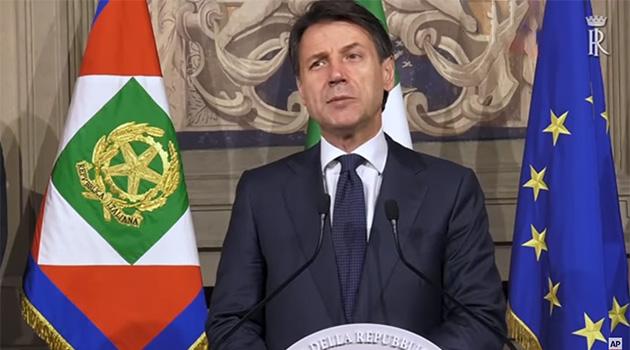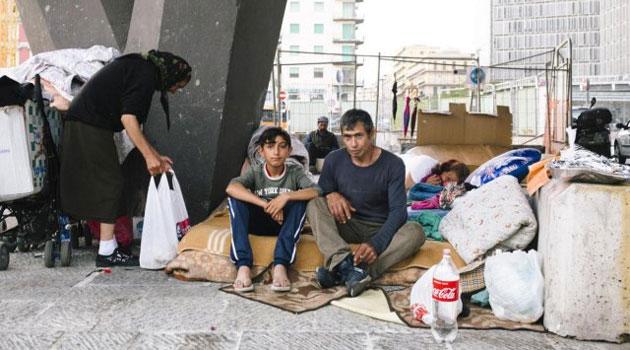Italy: New Government demands closure of Romani encampments, redistribution of asylum-seekers by EU

New Italian Prime Minister Giuseppe Conte has emphasized that his country is demanding the automatic, compulsory redistribution of asylum-seekers throughout the EU by the Member States. He made the remarks in a speech on 6 June to the Italian Senate which, after debate, gave the new “Government of change” a vote of confidence.
The lower house was slated to hold a confidence vote on 7 June. Conte also said his Government will do its best to push for a more attentive attitude toward Russia and a reassessment of the Western sanctions against it.
The Italian Government’s program also includes closing all the camps inhabited by Romani people in the country. Observers agree that Conte’s speech held no surprises and basically reiterated the contents of the coalition agreement between the populist Five Star and Liga parties.
Maurizio Martina, the acting leader of the Democratic Party, which is now in opposition after leading the previous Government, called the PM’s address “an ordinary speech full of clichés.” Critics also drew attention to the fact that the new PM mentioned neither the word “culture” nor the word “education”.
During the subsequent debate, former Italian PM Mario Monti warned that if Italy does not manage its public finances prudently, it is in danger of being put under the supervision of the European Central Bank, the European Commission, and the International Monetary Fund. Holocaust survivor Liliana Segre, who is an Italian Senator for life, emphasized that she will oppose any new laws aimed against Romani people.
“I refuse to see today’s democratic civilization maimed by special laws against those who live itinerantly,” Segre said. “If that happens I will stand against it with all my energy.”
“I know what it is to go into hiding, to be an asylum-seeker,” the senator said. “I know imprisonment, I know hard labor, I worked as a slave when I was a little girl in a concentration camp.”
The new Interior Minister Matteo Salvini, the head of the Liga party, which is considered ultra-right, wants to enforce the closure of all Romani settlements. He also wants to massively deport immigrants who lack the requisite documentation.
“We will emphatically call for the Dublin Regulations to be overturned so we can achieve the effective maintenance of fair burden-sharing and an automatic system of compulsory redistribution of asylum-seekers,” Agence France-Presse quoted Conte as saying. Reform of the so-called Dublin system has been discussed by the EU for at least two years.
The option of compulsory redistribution of asylum-seekers throughout the EU when one of the Member States finds itself burdened by a crisis scenario involving them is still unacceptable to the countries of Visegrad group – the Czech Republic, Hungary, Poland and Slovakia. Conte is leading a new Government formed by the representatives of the anti-immigration, euroskeptical Liga party and the Five-Star party, which was formed as a protest against the previous political order.
These parties collaborate in the European arena with other nationalist parties, including the Czech “Freedom and Direct Democracy” (SPD) party – although one of the priorities of the SPD’s political program is rejection of such EU collaboration on asylum policy. The new Italian PM also promised on 6 June to attempt to reduce the enormous debt of the Italian state.
To achieve that he wants to spur economic growth, not make use of cost-cutting measures. After the debt of Greece, the debt of Italy is the biggest in the eurozone, but Conte said he believes it is sustainable.
The Government’s aim now is to reduce Italy’s backwardness in terms of economic growth compared to the rest of Europe. “That’s our goal,” the PM emphasized, also speaking of a “unified European home” and a “stronger but fairer Europe.”
Among other matters, Conte also said “We will defend opening up to Russia, which has consolidated its international position in different geopolitical crises in recent years. We will advocate for revision of the system of [Western] sanctions, beginning with those that are having a harsh impact on civil society in Russia.”
The sanctions are being maintained by Rome along with the rest of the European Union in response to the annexation of Crimea by Russia and its unacknowledged occupation of eastern Ukraine, officially now ruled by local insurgents. The chair of the Foreign Affairs Committee of the Russian Senate, Konstantin Kosachev, called Conte’s remarks “positive” but added that it remains to be seen how Italy will cope with the influences of the other EU Member States in this regard.
